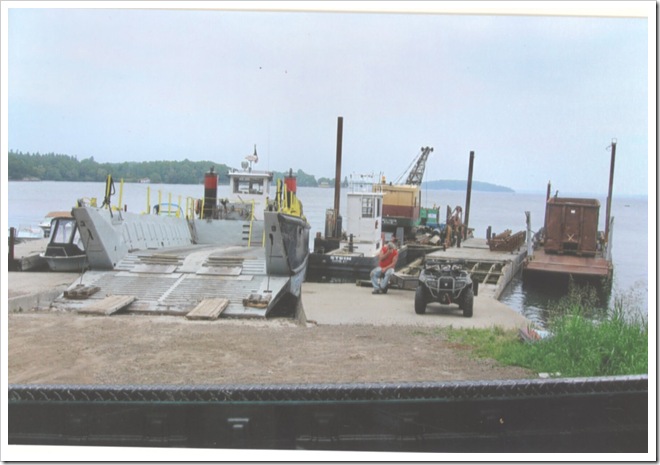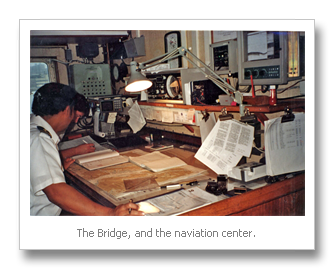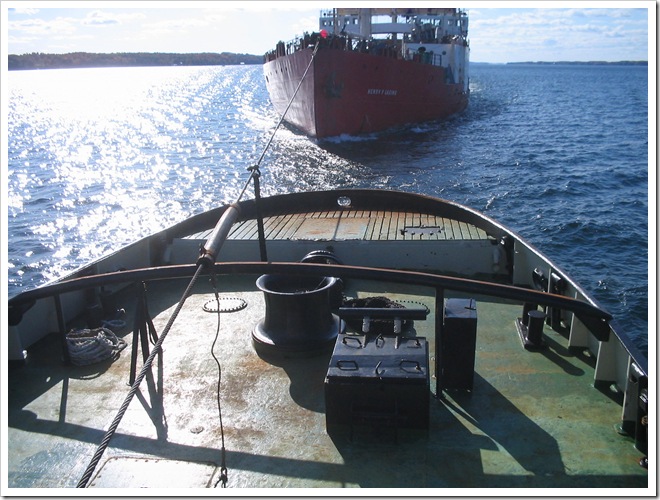Editor’s Note: We asked the question of “Doc” Withington in January: “What is it like to live on an island in the winter?” - and from him we learned what winter island, living was about. In May we asked him “What does being a boater mean to you?” We had no idea that the answer would be as detailed nor did we know what an accomplished gentleman our “Doc” is. I hope that you enjoy his answer as much as we did!
What does being a boater mean to you?
I became fascinated with boats at the age of four, in the mid 1940's. That’s when my father came home from WWII and we began to summer at Sackets Harbor. Our first boat was a flat-bottomed rowboat with a 5 horsepower Elto “knuckle-buster” (outboard) motor. It always had to be primed to get it started and as the propeller was fixed, we steered by pulling on ropes tied to the rudder.
We upgraded to the raised-deck Gar Wood which had seen service, during Prohibition, as a rum-runner chaser. We followed “Gar” with some steel-hulled cruisers and several more craft. I was now in medical school which was followed by an internship and residency. After marriage I joined a Watertown, orthopedic-surgery practice. So, for some time, boating was just a dream.
Eventually, after exploring the Islands in an antique Chris Craft cruiser for several years, we bought a sailboat. By this time my wife, Rosanne, had bonded with the River and she began her search for a cottage, finding a glorious, old, property on Round Island. It became our home.
I was happy to be an experienced, recreational, boater until I got to know the Rusho family from Grindstone Island. Their maritime heritage goes back to sailing schooners bringing Picton Island granite to Chicago.
Junior Rusho builds boats at his shop in Clayton, but he is probably known best for being the master of the barge, Maple Grove, which transports goods and services to the Islanders. Junior said, one fine day, “Doc, if you’d just get a license, I sure could use some help on the barge”. It was then that I became aware of how little I knew about boating.
 |
| Junior Rusho's Maple Grove, and other barges in the construction fleet. Photo courtesy R. Withington |
| |
There are many commercial-and-professional mariners who earn their living in our Islands or by passing through them: marina operators; contractors; ship captains and pilots; tour-boat operators and their crews; those involved in public safety; plumbing, electrical, and-building contractors; and others. Many don’t leave the water until well into December. In March, they return to break ice and to get properties ready for the “summer” folks. It is too bad that much of what they do is unseen, taken for granted, and often under-appreciated by cottagers, boaters, and visitors.
Soon after Junior’s suggestion I spent my Saturdays studying for a captain’s license. I had already started helping him on the barge, as time permitted, and it was hard to get time off for some of his better trips – fish stocking, or the delivery of the barge to Clayton from Omaha, Nebraska. Missing that trip was a great disappointment. Eventually, he said, “Doc, your work is interfering with your “good” time and if you had more time, for “good” time, look at all the things you could learn and places you could go.”
Having a captain's license is like joining the Boy Scouts. You learn to walk before you are allowed to run – starting with a “6-pack”. That license permits you to carry six passengers for hire, as in being a fishing guide. Then you start accumulating sea time while working on the merit badges.
Study to acquire a “100-ton” license; add sail-and-assistance towing. Study about plotting courses, estimating times of arrival and learning to use a tide table. Continue with learning about the footnotes on the charts, learning the rules of the road so you can recite them by heart, just like nightly prayers. How do you know which side of a suction dredge you should pass on? What does that whistle signal mean and is it for you? Who was Plimsoll and did he really develop the system of marking "graffiti" on the sides of ships? What about center of buoyancy, the dew point, weather, survival at sea, marine firefighting, bridge-resource management? It never ends :-)

I was now developing an understanding about the professional lives of our Island merchant mariners. There are many similarities between being a surgeon and a captain of a vessel, one of which is that neither should just “jump into the situation and zoom to the destination”. As a licensed captain,you become more aware of your responsibility for the comfort and safety of those aboard. You are responsible for the welfare of your passengers and you must use your skill and experience to ensure, to the best of your ability, that they and your crew have a safe-and-pleasant journey.
As with surgery, I will never know all there is to know about boating. "Surgery gave me a lifetime of memories and experiences. Boating does the same. Salvage work on Lake Ontario, ship-assist docking in Ogdensburg, transporting heavy equipment, driving boat tours for the Antique Boat Museum – all add, daily, to the thrill of something being newly-accomplished and the learning process never stops.
I have discovered that being a "boater" doesn't mean the same to everyone. To me it is part of my being. I feel a kinship to those before me who loved, braved, and sometimes cursed the sea. I appreciate those who taught me to be a boater,..... and those who showed me why I should. For each of us on the River there is something in boating. In searching for it, you may just find yourself.
By Richard Withington, MD. Round Island.
Dr. Dick Withington is a retired Orthopaedic Surgeon. We learned in January about his living out a childhood dream by spending his fourth consecutive winter alone at the head of Round Island. His wife Roseanne heads to Florida when "Rivercroft" is closed in October and Dick moves into the former servants' quarters, "Wintercroft". This month we learn about his Summer excursions. Not only is he a well known for his Emergency Response activities, but we now find out about his passion for “working on the boats”.
 |
| Commercial licensed captains are marina operators, contractors, ship captains, tour boat operations, pilots, and those involved in public safety. We depend on them to assist in many ways. Here is one example provided by Dick Withington. |